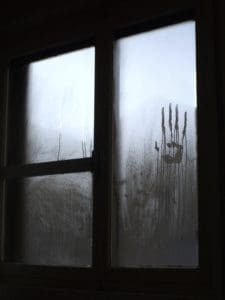Marina Carr: The Modern Day Lady Gregory

Updated On: April 27, 2024 by Ciaran Connolly
Marina Carr is a modern Irish playwright who has received a dozen critically acclaimed awards and whose work has been translated into many languages worldwide. She has written over 20 plays and has been made a member of the Aosdána. Her most famous works include ‘By the Bog of Cats’ which was first produced in 1998, ‘Marble’ which was first produced in 2009, ‘Woman and Scarecrow’ which was first produced in 2006; and ‘Portia Coughlan’ which was first produced in 1996. We cannot wait to see what the future holds for this genius playwright.
Dublin Born and Raised

Sourced: Flickr, TEDx DCU
Marina Carr was born in Dublin on 17 November 1964. However, she spent most of her childhood at Pallas Lake in County Offaly. Throughout her life, the young Marina Carr was always surrounded by the arts as her father was playwright Hugh Carr, who also dabbled in music, and her mother, Maura Eibhlín Breathneach, a school principal, wrote Poetry in Irish. Therefore, it is no surprise that the literary arts influenced her and her siblings. Later in her life, Marina Carr studied English and Philosophy at University College Dublin (UCD) and graduated in 1987. In 2011, UCD awarded Carr an Honorary Doctorate in Literature.
Her career continued in Dublin, where she worked as a writer-in-residence at the Abbey Theatre. While writing here, she also taught at Trinity College. However, Carr also travelled to the United States to work through her successful literary career. While in the United States, she taught at Princeton University and Villanova University. Later, she returned to Dublin, where she most recently lectured at Dublin City University (DCU).
Carr, her husband, Dermot Hickey, and her children live a hectic life. This has shaped her writing and added humour and realism to her literary work.
Marina Carr: Ireland’s Leading Female Dramatist

Sourced: Flickr, Universidad de La Rioja
Marina Carr is considered Ireland’s leading female playwright. She has written and produced many plays that are known worldwide today. Her most well-known are arguably ‘By the Bog of Cats’, ‘Woman and the Scarecrow’, ‘The Mai’, ‘Marble’, and ‘Portia Coughlan’. These plays have been acclaimed and are works of literary genius.
Marina Carr’s ‘Marble’ is part of her book ‘Plays 2’. It is a two-act play about two married couples and their everyday struggles. It is one of her most famous plays. It was translated into Spanish and performed in Madrid in November 2016 at the Teatro Valle-Inclan.
By the Bog of Cats
‘By the Bog of Cats’ was first performed in the Abbey Theatre, Dublin, on 7 October 1998. Since its opening, it has been reproduced many times in many countries. It has reached as far as Brazil and was translated into Portuguese for these performances. ‘By the Bog of Cats’ is a three-act play that contains elements of the supernatural, motherhood, prejudice, and betrayal. It is a play about loss and sorrow but full of laughter and fun.
In the first act of ‘By the Bog of Cats’, we are first introduced to Hester, who is dragging a dead black swan across the snow at the Bog of Cats; as she is doing this, the ghost Francis arrives to collect her, however, realises that he is early as she is still alive. We quickly learn that Hester’s former love, Carthage, will marry another, Caroline Cassidy. Hester begins to dig a grave for the swan, and while doing this, she talks about how she was abandoned in the swan’s lair by her mother when she was a child.
Hester has waited here since she was abandoned, waiting for her mother. In the next scene, Hester plays with Carthage’s daughter while speaking with Mrs. Kilbride. Mrs. Kilbride is cheating on cards and talking against Hester’s status and fortune. Before the wedding, Caroline arrives to speak with Hester while wearing her wedding dress. She is asking Hester to allow her to marry Carthage without interruption. Following this visit, Carthage then visits Hester. He is also in his wedding clothes and has the exact reason for visiting. Hester refuses to leave the house and insists she will stay there until her mother returns.
Act Two is about Caroline and Carthage’s marriage, interrupted by multiple ghosts and people. The ghost of Hester’s brother arrives to find out why Hester killed him, Mrs Kilbride arrives wearing a white dress pretending to be her son’s bride, and Mrs Kilbride interrupts the bride’s father’s speech to talk about her son. Finally, Hester arrives at the wedding wearing a wedding gown, the dress that Carthage bought her nine years previous. After being forcibly removed from the party, Hester swears revenge against them all.
The third and final act is full of revenge, death, and destruction. We watch as Hester walks away from her burning house along with her ghost brother, Joseph Swan. We discover that she did not kill him for money but because she was jealous of the relationship he had with their mother. She also reveals that Carthage took all his money to buy land and left Hester for Caroline.
Monica arrives again and begs Hester to leave the house after she burns the house down and ruins the wedding. However, Hester is still waiting for her mother. Carthage arrives outraged, and the pair fight. Carthage threatens to take Josie away from Hester and declares her an unfit mother. In the end, ghost Fancier visits again to take Hester. Josie begs Hester not to leave her, so Hester kills her by slitting her throat to spare her the loss she had through living a motherless life. The ghost Fancier performs a death dance with Hester and then stabs her in the chest to kill her.
By the Bog of Cats Quotes
“sellin’ me and Josie down the river for a few lumpy auld acres and notions of respectability” – Hester to Carthage
“that child…will live as long as this black swan, not a day more, not a day less”
“I can’t lave till me mother comes. I’d hope she’d have come before now and it wouldn’t come to this. Don’t make me lave this place or somethin’ terrible’ll happen” – Hester at the Wedding
“Ya think I slit your throat for the fewauld pound me father left me?” Hesther to her brother
“I’ve a right to sit in me own yard without bein’ ogled by the likes of you” – Hester to Xavier
Woman and Scarecrow
Marina Carr’s ‘Woman and Scarecrow’ was first staged at the Royal Court Jerwood Theatre in London in 2006 and later opened at the Irish Repertory Theatre in New York in May 2018. It is a two-act (2 hours and 20 minutes long) play containing five characters: Woman, Scarecrow, Him, Aunty Ah, and Thing. None of the five characters have names; they are only referred to by these pronouns.
This short play focuses on a dying woman, her final hours on earth, and her time reflecting on her life. The woman is often portrayed as lying in bed, and the only other piece of furniture mentioned is a wardrobe, which seems to have a supernatural element lurking. The mysterious presence within the wardrobe is alluded to as death, symbolising its closeness and imminent approach. While the woman is reflecting on her life, we learn that her role was always to be a mother and wife; she had eight children. However, the ninth died. We also know that her husband was not faithful to her and that she remained dependent on him regardless of this.
We also learn that her life was not a happy one when she was born. Her mother died, and her cruel aunt raised her. She then married, and this marriage was not a happy one. However, throughout her life there were times she was strong and independent, for example, she refused to wear her wedding ring to the grave, and she also engaged in affairs. This independence is also shown when she dies as he is not in the room with her – freeing her from her miserable life.
Throughout the play, her companion is the Scarecrow – this may have been a figment of her imagination created from the morphine. This scarecrow keeps the ‘death’ figure in the closet at bay.
Woman and Scarecrow Quotes
“We don’t belong here. There must be
another Earth. And yet there was a moment when
I thought it might be possible here. A moment
so elusive it’s hardly worth mentioning . . .”
“Walking is no longer an option. He’s waiting in the wardrobe. Can’t you hear him sucking his oily wings?”
The Mai
Marina Carr’s ‘The Mai’ was one of her plays produced at The Abbey Theatre and was first performed on 5 October 1994. This play focuses on a family that contains four generations under one roof. The central figure is The Mai, a 40-year-old woman struggling to save her marriage and her family’s happiness. A central focus of this play is how history repeats itself in a never-changing cycle. The narrator is the daughter, Millie, giving a nonbiased story about the family. The theme of folklore is apparent as Millie shows interest in Owl Lake. Folklore is common within Marina Carr’s plays.
The first act of ‘The Mai’ is set during the summer of 1979 and opens with the absentee husband and father returning after five years, hoping for a second chance. Throughout the play, Mai struggles with keeping her marriage alive while her husband, Robert, consistently cheats. Eventually, Mai admits to her daughter, the narrator, that she cannot see a happy, peaceful life with Robert.
The second act of ‘The Mai’ is set years later, and we see the outcome of the relationships from the first act. We learn that the past will always repeat itself. From the play, we know that the wives will always put their husbands before their children. There are also many links between marriage and capitalism. When women lose their husbands, they lose everything.
Portia Coughlan | Winner of the 19th Susan Smith Blackburn Prize
Marina Carr’s ‘Portia Coughlan’ was first produced by the Abbey Theatre, Dublin, on 27 March 1996. This play contains themes of love and friendship; however, it is also full of grief and despair.
This play follows the life of Portia Coughlan, who lives a happy life with her wealthy husband and three sons. However, she is grief-stricken by the death of her twin brother. The play opens on her 30th birthday, 15 years after the drowning of her brother, Gabriel. Due to the haunting of her brother, she is unable to be a good mother or wife. She has a drinking problem and drinks brandy throughout the day. The play ends with Portia taking her own life in the same way her brother died; she drowns herself. Her ghost brother consumes her life to the point that she can no longer live.
‘Portia Coughlan’ mirrors aspects of ‘By the Bog of Cats’. Their dead brothers haunt Hester and Portia Coughlan, drink a lot of alcohol, and are feisty characters.
Marina Carr’s ‘Portia Coughlan’ is still popular today and will play at The Vic, London, in September and October 2020. Caroline Byrne is directing this production, and you can buy tickets here.
“There’s a wolf tooth growin in me heart and it’s turnin me from everywan and everythin I am”
Modern-day Lady Gregory
Lady Gregory is one of Ireland’s celebrated dramatists from the Irish Literary Revival and a co-founder of the Abbey Theatre. Today, Marina Carr’s plays have been performed in the Abbey Theatre and contain themes similar to Gregory’s. Their plays are identical in poetic language, story, and female characters. Marina Carr also draws upon Irish folklore like Gregory did, such as ‘The Golden Apple’, published in 1916, and ‘The Full Moon’, published in 1913.
Awards
Marina Carr has received many awards throughout her successful literary career. She was also made a member of the Aosdána, an Irish association of artists.
‘The Mai’ won the Dublin Theatre Festival Best New Play Award in 1994 – 1995, and ‘Portia Coughlan’ won the 19th Susan Smith Blackburn Prize in 1996 – 1997.
Marina Carr also won the 1998 Irish Times Playwright Award, the 2001 E. M. Forster Award from the American Academy of Arts and Letters, and the American/Ireland Fund Award, which included a $20,000 award. She also received the Macaulay Fellowship and Hennessy Award and the 2016 Windham – Campbell Prize from Yale University, which included a financial award of $165,000. She was the second Irish author to receive this prize from Yale University.
Have you watched any of Marina Carr’s amazing plays onstage? Tell us about your experience in the comments below!
If you enjoyed reading about Ireland’s Leading Woman Playwright, please learn more about Ireland’s amazing authors and writers here:
Brian Friel: His Life, Work and Legacy | Sean O’Casey | Greatest Irish Playwright | James Joyce: His Life, Work and Legacy | Irish Author Maria Edgeworth and her Life Work | Oscar Wilde: His Journey, Fame and Downfall | Paul Muldoon | Irish Poet | Derek Mahon: Ireland’s Leading Modern Poet | Irish Author Elizabeth Bowen | Life and Legacy | Irish Author Cecelia Ahern – Book and Film Success | Bram Stoker: Gothic Ireland and his famous Dracula






